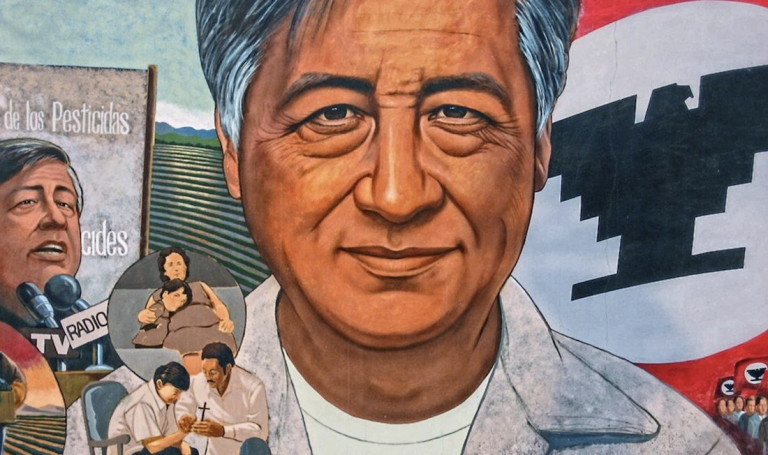
Chávez’ story resonates not just with farmworkers, but with anyone who believes in the dignity of labor and the pursuit of justice.
Chávez’ life was a gift to the marginalized, a reminder that justice, once planted, can grow into something extraordinary.

San Francisco, CA – In the tapestry of American history, few figures shine as brightly as César Chávez, a beacon of hope and justice for farmworkers across the nation. As we pause to remember Chávez, we celebrate a man whose life was a testament to the power of compassion, resilience, and nonviolent resistance. His legacy as a labor leader and civil rights icon continues to inspire generations, reminding us of the strength found in unity and perseverance.
César Estrada Chávez was born on March 31, 1927, in Yuma, Arizona, into a Mexican American family of migrant farmworkers. His early years were shaped by the harsh realities of agricultural labor—long hours, meager wages, and relentless uncertainty. When the Great Depression struck, the Chávez family lost their small farm, thrusting them into the migratory life that defined so many during that era. These experiences planted the seeds of empathy and determination that would later bloom into a movement for change.
In 1962, Chávez took a bold step that would alter the course of labor history.

Alongside Dolores Huerta, he co-founded the National Farm Workers Association, which evolved into the United Farm Workers (UFW). Their mission was simple yet revolutionary: to secure fair wages, safe working conditions, and respect for the farmworkers who toiled to feed the nation.
Inspired by Mahatma Gandhi and Martin Luther King Jr., Chávez embraced nonviolence as his weapon of choice, proving that peaceful action could topple injustice.One of Chávez’ most triumphant moments came with the Delano grape strike, launched in 1965.
Farmworkers in Delano, California, demanded better pay and conditions from grape growers who had long ignored their plight.
Chávez organized a 300-mile march from Delano to Sacramento, a pilgrimage that captured the nation’s attention and rallied support for the cause.
What followed was a five-year boycott of table grapes, a grassroots effort that united consumers, activists, and workers. In 1970, the growers relented, signing a historic contract that marked a victory for farmworkers and a milestone in labor rights.
Chávez’ vision extended beyond the fields.
He recognized the toll of pesticides on workers’ health and pushed for environmental protections, blending labor advocacy with ecological awareness. His commitment often took personal sacrifice—most notably through hunger strikes, like the 25-day fast in 1968, which he undertook to reaffirm his dedication to nonviolence and galvanize the movement. These acts of courage drew allies from all corners, amplifying the farmworkers’ voice.

The ripple effects of Chávez’ work are felt today.
The UFW remains a vital force, advocating for those who harvest our food. His famous phrase, “Sí, se puede” (“Yes, we can”), has transcended its origins, becoming a universal anthem of empowerment.
Schools, streets, and holidays bear his name, a tribute to a man who turned adversity into action.
Chávez’ story resonates not just with farmworkers, but with anyone who believes in the dignity of labor and the pursuit of justice.
Reflecting on Chávez’ life, we see a roadmap for change.
He showed that one voice, amplified by community and conviction, can challenge entrenched power. His nonviolent philosophy reminds us that progress need not come through conflict, but through solidarity and shared purpose.
In a world often marked by division, Chávez’ example offers a timeless lesson in hope.
As we remember César Chávez, we honor a legacy built on sacrifice and triumph.
His journey from the fields of Arizona to the forefront of a national movement speaks to the potential within us all to effect change. Today, his spirit lives on in the farmworkers who carry forward his fight, in the activists who echo his call, and in the simple yet profound belief that yes, it can be done. Chávez’ life was a gift to the marginalized, a reminder that justice, once planted, can grow into something extraordinary.
Honoring the Legacy of César Chávez and the United Farm Workers (April 12, 2025)
See: Cesar Chavez Day: ¡Sí Se Puede! Celebrating UFW’s César Chávez’s Enduring Impact (March 31, 2025)
#CesarChavez #FarmworkersRights #LaborLeader
#CivilRights #NonviolentActivism #UFW #SiSePuede
TAGS: César Chávez, United Farm Workers, labor rights, civil rights,
activism, nonviolence, farmworkers, Mexican-American history
